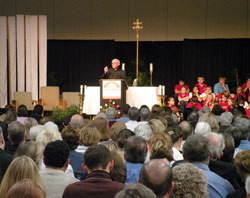Give people ‘the look of love which they crave,’ keynote speaker says

Jesuit Father Fred Kammer delivers a keynote address to the more than 600 participants at the “Spreading Hope in Neighborhoods Everywhere” conference on Oct. 1 in Indianapolis. The priest encouraged participants, in their ministry of charity, to do everything with the love of God in their heart and the look of love on their face. (Photo by Brandon A. Evans)
By John Shaughnessy
In a world where many people’s lives are touched by heartbreak and despair, the message of Christ calls Catholics to offer help and hope in the most human ways:
Feed the hungry. Give drink to the thirsty. Welcome the stranger. Clothe the naked. Visit the sick and imprisoned.
And do everything with the love of God in your heart and the look of love on your face.
That basic message formed the essence of the opening keynote address that Jesuit Father Fred Kammer gave on Oct. 1 at the kickoff conference for a yearlong social ministry renewal in the archdiocese that is known as SHINE—“Spreading Hope in Neighborhoods Everywhere.”
Using Pope Benedict’s first encyclical as a framework, Father Kammer extensively referred to “Deus Caritas Est” (“God Is Love”) to focus on the practice of organized charity in the Church.
“One cannot call oneself a Christian believer without living a life filled with active love for one’s neighbor, especially those who are poor,” Father Kammer told more than 600 people from across the archdiocese who gathered at Lucas Oil Stadium in Indianapolis for the kickoff event.
“[Pope] Benedict states that, in God and with God, we are able to love those persons whom we do not like or even know. To them, we can offer what they need and, going beyond their outward necessities, can ‘give them the look of love which they crave.’ ”
That “look of love” will be essential in the coming year as parishes, schools, agencies and other institutions throughout the archdiocese make a renewed commitment to social ministry.
“Many of those served by Catholic social ministries come from abusive home environments, life on the streets, a world of addictions, chronic unemployment and the grinding world of persistent poverty,” noted Father Kammer, a past president of Catholic Charities USA and now the executive director of the Jesuit Social Research Institute at Loyola University of New Orleans.
“Listening to and sharing in their experience of difficulty and chaos is the first step for them toward recovery or freedom or self-empowerment or simple dignity. This is what the Good Samaritan does when he breaks his journey and becomes involved in the life of the man by the road.”
Father Kammer also referred to the pope’s belief that “the Church’s deepest nature is expressed in her three-fold responsibility: proclaiming the word of God, celebrating the sacraments and exercising the ministry of charity.
“One would expect to find all three of these essentials in every parish that calls itself Catholic,” Father Kammer said.
“There are always people suffering, people who are lonely, and people with material needs that require a response that extends beyond the material to the care and refreshment of their souls.”
Providing that response defines Christians, he said.
“What the pope and the bishops are saying to us is that charity and justice are not just deeds that we do to earn heaven or avoid hell. They fundamentally reveal whether we know the God of charity and justice and, even more, the son Jesus who embodied God’s love in human history and continues to be revealed in the poor and the vulnerable.” †
